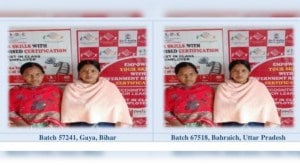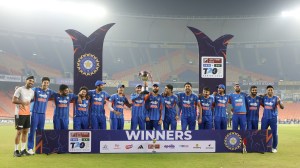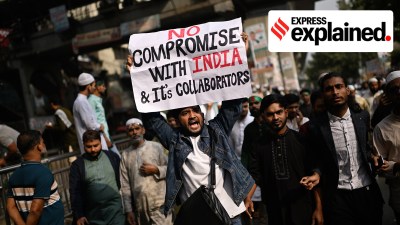“…This is adding insult to injury to the nation. Kindly say something about it…Your Lordships may read what is not written,” Solicitor General Tushar Mehta told a five-judge Constitution bench presided by Chief Justice of India D Y Chandrachud as it wrapped up hearing on petitions challenging changes made to Article 370 of the Constitution.

The bench, also comprising Justices S K Kaul, Sanjeev Khanna, B R Gavai and Surya Kant, which reserved its judgment on the petitions after a 16-day hearing, said it “will analyse” the affidavit.
Hearing a plea, which alleged that he had raised “Pakistan Zindabad” slogans in the Jammu and Kashmir Assembly in 2018, the court had on Monday asked Lone, who is one of the petitioners in the Article 370 matter before it, to file an affidavit stating that he “owes allegiance to the Constitution of India and that J&K is an integral part of India”.
Lone’s one-page affidavit, submitted on Tuesday, said: “I am a responsible and dutiful citizen of the Union of India. I have exercised my right to approach this Hon’ble Court through Article 32 of the Constitution” and “that I reiterate the oath taken while being sworn in as Member of Parliament to preserve and uphold the provisions of the Constitution of India and to protect the territorial integrity of the Nation.”
Concluding his arguments in the Article 370 matter, Senior Advocate Kapil Sibal, who appeared for some of the petitioners, questioned the reorganisation of the erstwhile state into Union Territories of Jammu and Kashmir and Ladakh and the non-restoration of statehood for J&K even after more than four years.
“How can they make a state into a UT? Under what provision of law? What power? Your Lordships… there may be a national security situation and, therefore, they may temporarily need to do that. But that national security situation is dealt with by Article 352 of the Constitution… It is also not their case that they did it for national security. Pulwama happened in February 2019 during President’s rule. And then they held elections in May 2019,” said Sibal.
Story continues below this ad
“And what is the justification of not constituting the state for 4.5 years?…You say you are going to have municipal elections, local government elections, that tourism has increased. What’s the impediment then? What is the constitutional logic or basis on which you can deny the people of Kashmir a statehood…,” he asked.
To a query from the bench, the senior counsel agreed that Article 370 was the result of a “political compromise to ensure greater flexibility”, and added that “everybody was part of the process. All the key players were collaborating in drafting 370…”.
Underlining that the court is “ultimately the arbiter of how this Constitution should look like and how it is to be interpreted”, Sibal said: “Let the court speak on behalf of people of India because this court, this government, or any government or any administration acts for the people of India. And it should not be that acts are done when a part of the people of India are silenced, who have never been consulted and whose fate would be decided by the Cabinet sitting here without reference to Parliament, without reference to legislature, without reference to the people. People are central to the Constitution of India. We should not forget that.”
Appearing for some other petitioners, Senior Advocate Rajeev Dhavan said there are many compromises in the Constitution. For instance, Article 25, he said, adding that it allows Sikhs to carry their daggers. “You want to get rid of that? You will have to have a constitutional amendment. This is a compromise,” he said, adding that “the entire 6th Schedule is a compromise”.
Story continues below this ad
Dhavan said it is the process of Constitution making — to accommodate a large number of views. He also contended that the Centre was “unable to provide” a roadmap for restoration of statehood.
Senior Advocate Dushyant Dave, also appearing for some petitioners, asked if the Government of India, after using powers under Article 370 for the last over 70 years, can now say that the provision is temporary. He said: “Merely because the government has changed, does it mean it has become temporary?”
Dave contended that it is not the case of the Government of India that Article 370 has not worked for the last over seven decades. “There is not one example to show that 370 has failed. Every time the government wanted to apply anything, it was automatically accepted by the state of J&K,” he said, adding that it is, therefore, “unfathomable why is it that suddenly you get up and overnight do this?”
Dave pointed out that the BJP’s 2019 manifesto said it will abrogate Article 370. “Nobody is understanding what 370 is. 370 integrates J&K with India,” he said.
Story continues below this ad
Constitution framers, he said, wanted to solidify the relationship of J&K with India, not just temporarily. “And they realised that the only way we can do so is through Article 370. Any other way we would have lost J&K,” he said.
Dave said: “It is not that people of J&K will die if 370 is taken away. Question is that people have a right to feel that what was understood constitutionally, a constitutional promise, can it be taken away in this manner that has been done? They are also citizens of India, they are not some foreigners.”
He said the government is taking away from a sizable section of citizens of India, a special status which was conferred upon them by Constitution framers.
Countering the Centre’s arguments that the situation in J&K has vastly improved after the Article 370 move, the senior counsel said, “Even after 2019, violence has gone on unabated. Every week we find people are being killed, soldiers are dying. You have almost a million troops in Kashmir… Yes, tourism has developed because Kashmir is the one of most beautiful places on Earth, it is heaven… Kashmir is far more beautiful than Switzerland…”
Story continues below this ad
Dave submitted that “if constitutional morality is allowed to be trampled with… in this fashion, then nothing… Constitutional morality must be in the heart and bosom of all citizens. Let us not allow the Union to steamroll so that people lose their love and affection.”
“You can’t rule by force all the time and if you have to rule by force, then there is no governance at all,” he said.









